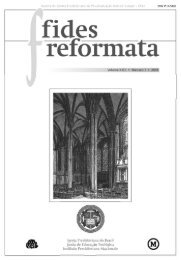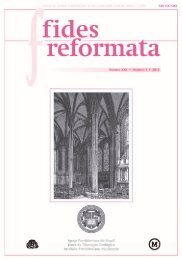Fides 22 N2
Um publicação do Centro Presbiteriano de Pós-graduação Andrew Jumper.
Um publicação do Centro Presbiteriano de Pós-graduação Andrew Jumper.
Create successful ePaper yourself
Turn your PDF publications into a flip-book with our unique Google optimized e-Paper software.
ELIAS MEDEIROS, THE REFORMERS AND MISSIONS<br />
was the final evaluation and judgement of Warneck regarding the Calvinist<br />
undertaking to reach the non-Christians in South America.<br />
Warneck then comes to his final comments and explanation for the lack<br />
of any “real missionary activity” after the Reformation, especially in Germany.<br />
47 “The reason of this,” states Warneck, “did not lie only in the fact that<br />
the world beyond the sea had never as yet come within the purview of German<br />
Protestantism,” nor in the fact “that the political conditions, chiefly the<br />
unhappy Thirty Years’ War, did not allow missionary enterprise to be thought<br />
of.” 48 The main reason for such silence towards any “real missionary activity”<br />
among the reformers and especially after the Reformation, according to Warneck<br />
was this: “The reason still lay in the theology which either did not permit<br />
missionary ideas to arise at all, or, if these began to find desultory expression,<br />
most keenly combated them.” 49 In other words, after everything is said and<br />
done, Warneck’s main bias toward the reformers comes to one single point:<br />
he disliked and misrepresented their theology, especially the doctrine of the<br />
sovereignty of God and election.<br />
I discussed Warneck’s doctrinal argument in Chapter 5 of my Ph.D. dissertation.<br />
It is sufficient to keep in mind that the doctrines of the sovereignty of<br />
God and predestination are the ultimate theological card sustained by Warneck.<br />
The other has to do with his historical reasoning in order to dismiss the Genevan<br />
and Dutch missions to South America where Reformed pastors and other members<br />
of the Reformed community were sent to plant churches and to establish<br />
Protestant colonies in the New World. Let us now turn to how Latourette, Neill,<br />
Kane, Winter, and Tucker have ostensibly assumed and appropriated Warneck’s<br />
arguments and propagated them through their works.<br />
2. LATOURETTE, NEILL, KANE, WINTER, AND TUCKER:<br />
WARNECK’S FOLLOWERS<br />
The purpose of this section is to highlight two things. The first is the fact<br />
that Warneck was, as Bosch and others have already stated, “one of the first<br />
Protestant scholars who promoted” the view that the reformers were silent regarding<br />
even the “idea of missions.” 50 The second is to evaluate how directly<br />
or indirectly Latourette, Neill, Kane, Winter, and Tucker follow the theses of<br />
the contemporary “father of missiology,” which have been discussed.<br />
47 Ibid. Warneck had already generalized this final thesis in Chapter I of his book when he dealt<br />
with selective writings of both Lutheran and Calvinist theologians.<br />
48 Ibid., 25.<br />
49 Warneck does not see any other explanation but that “it was still essentially the views of the<br />
Reformers which determined the attitude of orthodoxy to missions, only these views assumed a much<br />
more systematic and polemical cast” (Ibid., 25).<br />
50 David J. Bosch, Transforming Mission, 244. For more information regarding the literature on<br />
this thesis, see Chapter 2.<br />
150




